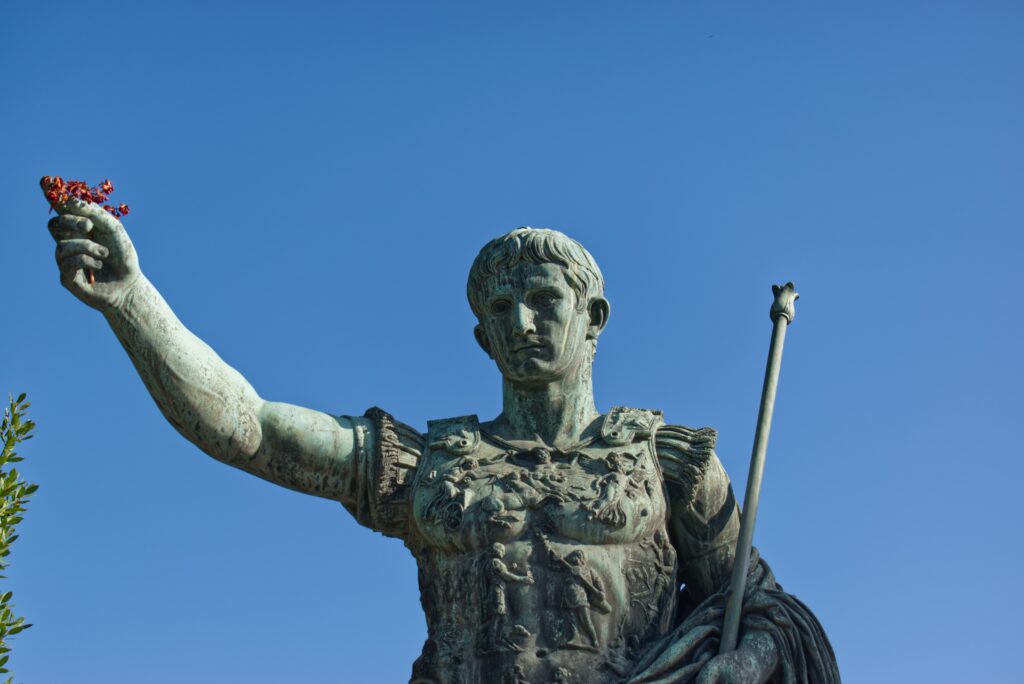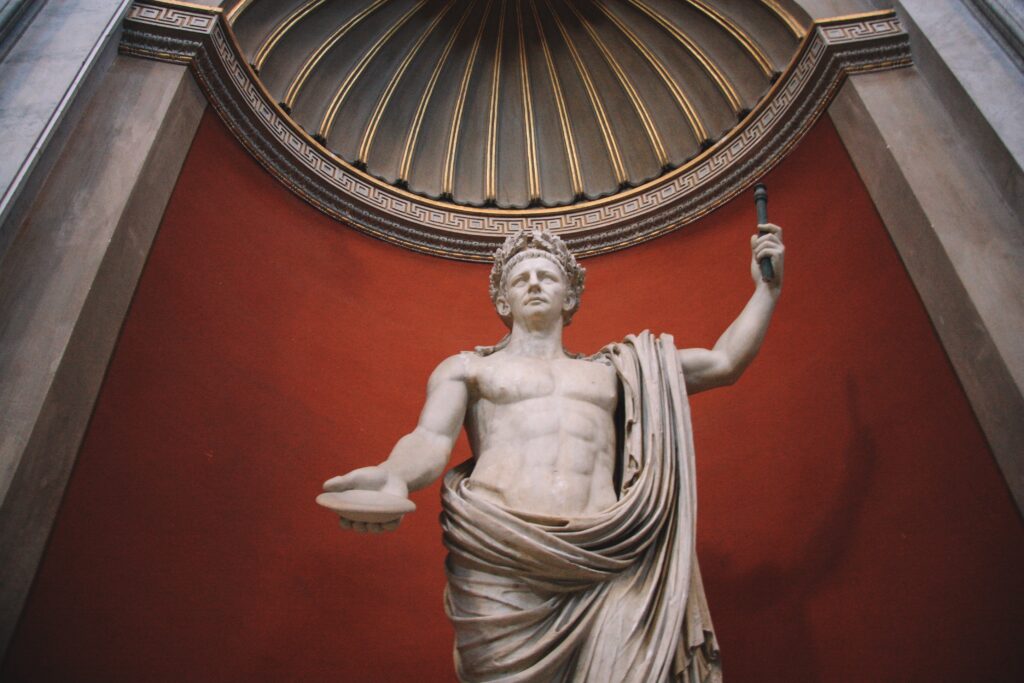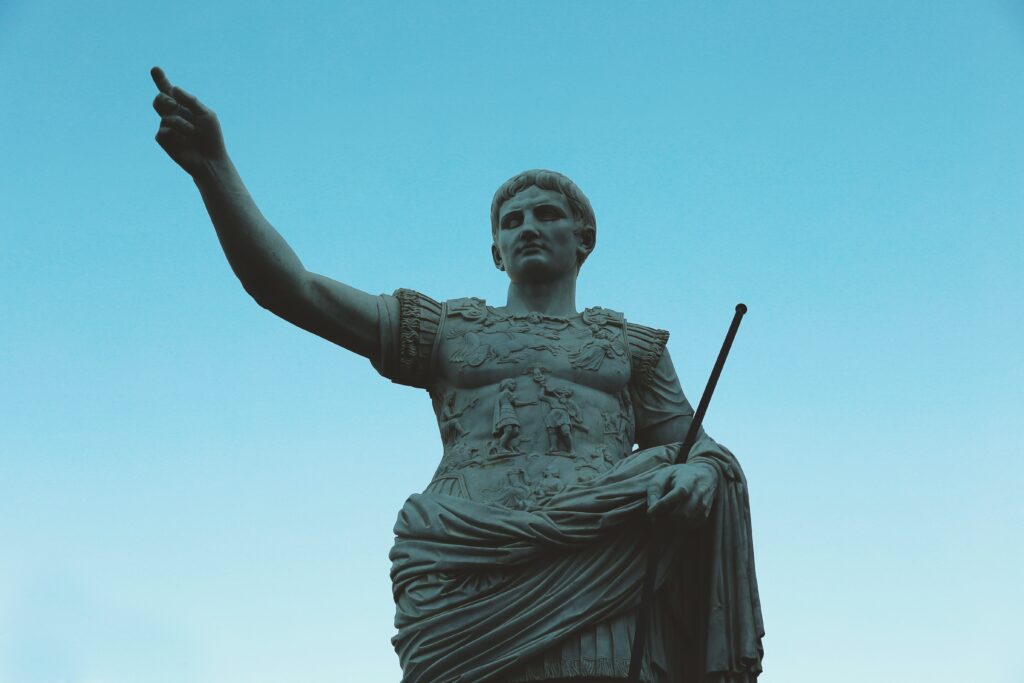What you need to know
To know how seriously the deification of Julius Caesar was taken, it is very important to know why Julius Caesar was deified in the first place. In order to know that, I will tell you a summary of his life and achievements. So let’s get started.
Who Is Julius Caesar?

Julius Caesar was a man who lived in the closing years of the Roman Republic, from 100 BC until March 15th, 44 BC. His full name was Gaius Julius Caesar.
Julius Caesar was born into a family that was of the patrician class. In Rome, there was two basic classes of people: patricians and plebeians.
Patricians wielded more power and control than plebeians over Roman society in general, although there had been times where things about their dynamic were forced to change and evolve over time. Julius Caesar’s patrician lineage traced back to an ancestor of his named Julus who was the son of Aeneas, which would also make him the grandson of Venus and thereby give Julius Caesar a line of relation to Venus as well.
However, even though Julius Caesar and his family had this incredible genealogy, the family was not particularly influential at all but they did have some wealth among them. Caesar’s father, also named Gaius Julius Caesar, was a governor of Asia, but he also died in 85 BC which made Julius Caesar suddenly become the head of his own family at the age of just 16.
Caesar becoming the head of his household coincided with a period of civil wars for Rome between his uncle, Gaius Marius, and a man named Lucius Cornelius Sulla. Sulla won the civil war and Caesar quickly became a target for him.
Sulla took everything from Caesar. He forced Caesar to quit being a priest for Jupiter, he took away the wealth and inheritance capabilities of Caesar and his wife, and he even forced Caesar into hiding.
Sulla wanted to kill Caesar, but he was swayed away from this decision by the intervention of Caesar’s mother’s family and of the Vestal Virgins who had both been key supporters of Sulla during the civil war. Sulla did not restore anything he had taken from Julius Caesar, but he did allow him mercy by doing away with the plan to have him killed and allowing him to return from hiding.
However, Caesar was still very weary of Sulla and so he decided to leave the city of Rome and join the military now that he was no longer a priest because it would keep him as far away from Sulla as possible while still allowing him to be involved in the daily public life of the Republic. Caesar would begin his military career in Asia and then continue it in Cicilia, and in both areas he earned much praise and reward for his excellent performance in battles, sieges, and diplomacy.
Caesar finally returned to Rome in 78 BC after the death of Sulla. However, because he had no ties to money anymore it meant he had to live among the lower classes.
Julius Caesar made the most of his situation by becoming a lawyer and an orator. He spoke with great passion and a loud voice and executed the ruthless persecution of government officials that had been known for corruption and exploitation of the people.
During this time, Caesar took a trip into the Aegean Sea and was kidnapped. His captors wanted to ransom him for 20 talents of silver but Caesar insisted that was much too low because he would come back one day and kill them. Sure enough, after his ransom was paid, Caesar went to Asia and raised an army then came back and fulfilled his promise by killing all of his kidnappers exactly as he said.
Caesar then repelled an eastern invasion against the Roman Republic, and for this he was elected military tribune. Then in 69 BC he was elected to quaestor. Unfortunately for Julius Caesar, this was also the year that his wife died.
Following the loss of his wife, Caesar decided to serve his position of quaestorship in Hispania. There is a legend that while he was there, Caesar observed a statue of Alexander the Great and wept that now at the same age Alexander had died that he had not achieved anywhere near as much as the man whom he idolized since a young age.
From 69 BC up until 60 BC, Julius Caesar continued to serve in political positions related to Hispania while also building up power and allies. He was not always the most successful, but his popularity continued to grow as well as his friends. Two important men whom Caesar gained the friendship of were Crassus and Pompey.
In 60 BC: Crassus, Pompey, and Caesar would form an official political alliance known as the First Triumvirate. For the next several years, the First Triumvirate would rapidly gain power until finally coming to dominate all Roman politics and essentially establish a balance of power and influence that revolved around the three men.
During the 50s BC, Caesar’s popularity and praise were propelled exponentially when he served as the leading general for Rome in the Gallic Wars from 58 BC to 50 BC which saw Rome take over the neighboring land of Gaul and subjugate the Gaulish people. This was a huge triumph for Caesar and he also got to be the governor of the conquered lands to help them speed up integration and administration as they became part of the Republic.
Unfortunately, there was a problem while Caesar was doing all of this. In 53 BC, Crassus had died in a war against the Parthians, the main rivals of Rome, and this caused the triumvirate to shift into a dichotomy between Caesar and Pompey. This would not be so bad, as Caesar and Pompey had been friends for more than a decade by this point, but Pompey began growing closer and closer to the Senate after the death of Crassus and the Senate hated Caesar.
In 49 BC, the Senate commanded Pompey to demand Caesar step down from his position and return to Rome. Caesar refused and crossed the Rubicon River, something that had never been done before by a Roman army, and marched to Rome with his forces. This broke out a new civil war that went on from 49 BC to 45 BC and was won by Caesar.
Caesar was left as essentially the only individual in Rome with any power, and out of fear the Senate decided to make him dictator for life themselves–though it is believed Caesar did not actually want this position and was planning to eventually relinquish it to return to the military. Caesar did not refuse to do anything with his power though, he did many social and political reforms throughout Rome including establishing the Julian Calendar and expanding Roman citizenship to many more people than it had ever belonged before.
Caesar also did many reforms for the veterans and forced the bureaucracy to become much more centralized to eliminate much of the general corruption of his day. These were things that were very popular among the people and the military, but not at all among the Senate and the elites of Roman society.
On the 15th of March in the year 44 BC, a conspiracy was carried out by Senators to kill Julius Caesar. They succeeded in doing so, believing they would be restoring the Republic to its golden days, but in actuality this hastened the Republic’s demise.
The conspirators would be hunted down by the Second Triumvirate, led by Caesar’s nephew, Octavian. And Octavian would succeed Caesar’s role in Roman society and eventually become Caesar Augustus, Rome’s first emperor.
Why Was Caesar Deified?

Examining his life shows you one key factor that came for Caesar ever since he returned to Rome after the death of Sulla. His popularity.
Caesar was abnormally popular to people from all walks of life. He was popular amongst his fellow patricians enough to form great allies like Crassus, he was popular amongst the religious leaders of Rome enough that the Vestal Virgins would interfere on his behalf, he was popular amongst the people enough that even those of the plebeian class would rally against his conspirators for killing him, and he was popular amongst the army enough that he would be remembered as one of the greatest military commanders in all of history.
One reason why the Senate likely wanted to deify Caesar is because they were worried that the Roman people blamed them, and not just the conspirators, for his death. The Senate had always been at odds with Caesar for his entire political career, even though plenty of them definitely did not want to actually kill him or anything like that. Having him be given the highest possible honor was definitely a start at rehabilitating their own image with the citizens.
Another reason for why Julius Caesar was deified is because the history of deification for great figures amongst men is something that has been common for a very long time in the civilizations of Antiquity. Leaders of places such as Egypt, which Rome was very familiar with especially in Caesar’s day, were deified quite often by the people and seen as being direct connections to the gods themselves.
However, Julius Caesar was deified in a bit of a different way than a pharaoh would have been. The Latin language actually had two words for someone that was a deity.
There was deus and then there was divus. Deus are what we normally think of when we think of gods, beings reigning over a concept, an element, a force of nature, a state of being, or anything else like that.
Divus were also seen as being like deities, but were not beings who reigned over anything in particular. A good way to look at Divus is to think of them in a similar way to how one imagines the heroes of Greek and Roman mythology but do not forget the divus are all divine.
So in this sense, we now have an understanding the Caesar was given the title of divus, not deus. Caesar was not made a god of something and he was not given a position among the pantheon. Instead, Caesar was given a place of honor that was among all gods and a postmortem title that indicated divinity and heroism.
So How Seriously Was It Taken?

To finally answer the question of Julius Caesar’s divinity’s legitimacy in the eyes of the Roman people, now that we have an understanding of who he was and what status he was actually given after death, we find that the answer can largely be answered by who you are. Different groups of Roman society were beginning to look at religion in different ways.
Among the common people, especially in the eastern portions of Roman territory such as Greece, Caesar was honored at the table along with other deities before feasting. Among the soldiers, Caesar was often the one whom they raised their cup in honor of for many years.
In particular, veterans were very respectful of Caesar’s status and this makes sense given how much of his life Caesar had spent in the military and how much of Caesar’s efforts had been spent to make life better for the soldiers and veterans. Caesar made the soldiers wealthier, more respected, and made obtaining land much easier for them and these were all things that the Roman military would not easily forget even long after he was dead and gone.
Looking at it from this perspective, Caesar can perhaps be viewed as a patron of soldiers. Soldiers could call on him and rally together under his name, and did so many times.
One group that likely did not really see Caesar in quite the same way as either of these groups would be the aristocracy. The aristocracy, even while Caesar was alive, had been rapidly shifting the way that they saw religion.
Religion amongst the aristocracy was turning away from being about the pure spirituality and about the dedication and was instead becoming much more like what we would consider a philosophy. Religious aristocrats were no longer concerned over how to honor their deities or what their origin and mythos were, they already knew all of these things by heart–the average Roman politician throughout the days of the Republic was expected to have the works of Homer and other poets of Antiquity memorized by heart and the Iliad and Odyssey were quoted numerous times in an uncountable number of Senate meetings throughout Roman history.
Rather than worrying about anything they believed they already knew, the Roman aristocrats allowed these way of affairs to continue as they normally would. Their focus instead became upon understanding the cosmos and interpreting what they could observe around them, they became more geared toward these broader metaphysical ideas than pursuing their spirituality.
Because of factors like this, it seems like the Roman aristocracy would not have really needed much of a divus figure. However, this is not to suggest that none of them ever honored Julius Caesar or that any of them did not recognize the title he was given.
No Romans, aristocracy or otherwise, denied that title of divus from Julius Caesar or spoke ill of him in any regard to suggest they did not honor him and his memory. It was more like they just did not have an active need for him in their lives the same way that plebeians and soldiers saw fit to routinely honor him.
Though this division did also have geographical divides. There were aristocrats in the east, much like the others I mentioned earlier who were among the common people of the east, that did honor Caesar among the gods and at the table in a similar manner to how those people did.
Pingback: Where Did Aphrodite Come From? – Esoteric History